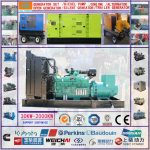Introduction
In various industries such as automotive, aerospace, electronics, and pharmaceuticals, humidity testing plays a crucial role in ensuring the quality and reliability of products. Humidity testing involves subjecting products to controlled levels of humidity to assess their performance under different environmental conditions. One of the key components used in humidity testing setups is a diesel generator, which provides a reliable and continuous power supply to maintain the desired humidity levels. In this article, we will explore the importance of diesel generators in humidity testing, their key features, benefits, and considerations for selecting the right generator for humidity testing applications.
Importance of Diesel Generators in Humidity Testing
Humidity testing is essential for assessing the performance of products under high humidity conditions, which can cause corrosion, degradation, and malfunction of electronic components, materials, and products. To create these controlled humidity environments, specialized test chambers are used that require a stable and uninterrupted power supply to maintain the desired humidity levels consistently. Diesel generators are well-suited for this task due to their reliability, durability, and ability to provide continuous power for extended periods.
Key Features of Diesel Generators for Humidity Testing
1. Power Output: Diesel generators are available in a wide range of power output capacities to meet the specific requirements of humidity testing setups. The power output of a generator is measured in kilowatts (kW) or megawatts (MW) and should be selected based on the size of the test chamber and the power consumption of the humidity control systems.
2. Fuel Efficiency: Diesel generators are known for their fuel efficiency, which is important for long-duration humidity testing applications. High fuel efficiency ensures that the generator consumes less fuel while providing consistent power output, resulting in cost savings and reduced environmental impact.
3. Durability: Humidity testing environments can be harsh and demanding, requiring equipment that can withstand moisture, temperature fluctuations, and continuous operation. Diesel generators are known for their rugged construction and durability, making them ideal for use in humidity testing setups where reliability is paramount.
4. Remote Monitoring and Control: Advanced diesel generators come equipped with remote monitoring and control features that allow operators to monitor the generator's performance, fuel levels, and operating parameters remotely. This capability is essential for ensuring the generator operates smoothly during humidity testing without the need for constant on-site supervision.
5. Automatic Start/Stop Function: Diesel generators can be equipped with an automatic start/stop function that activates the generator in case of a power outage or when the mains power supply fails. This feature ensures uninterrupted power supply to the humidity testing setup, preventing any disruptions in the testing process.
Benefits of Using Diesel Generators for Humidity Testing
1. Reliability: Diesel generators are known for their reliability and robust performance, making them a dependable power source for humidity testing applications. Their ability to provide continuous power for extended periods without interruption ensures the smooth operation of humidity testing setups.
2. Cost-Effective: Diesel generators offer a cost-effective power solution for humidity testing compared to other alternatives such as gas generators or battery backups. https://www.lkpowerplant.com/product/quick-delivery-emergency-standby-power-400kw-silent-type-diesel-generator-set-for-peru/ and maintenance costs of diesel generators make them a cost-efficient choice for long-term humidity testing applications.
3. Quick Start-Up Time: Diesel generators have a quick start-up time, allowing them to provide power within seconds of being activated. This rapid response time is crucial in humidity testing setups where maintaining consistent humidity levels is essential for accurate testing results.
4. Low Maintenance Requirements: Diesel generators have lower maintenance requirements compared to other types of generators, thanks to their simple design and robust construction. Regular maintenance checks and servicing can help prolong the lifespan of diesel generators and ensure their continued reliability in humidity testing applications.
Considerations for Selecting a Diesel Generator for Humidity Testing
1. Power Requirements: Determine the power requirements of your humidity testing setup, including the power consumption of the test chamber, humidity control systems, and any additional equipment that needs to be powered by the generator. Select a diesel generator with the appropriate power output capacity to meet these requirements.
2. Size and Portability: Consider the size and portability of the diesel generator, especially if space is limited in your humidity testing facility or if you need to move the generator between different testing locations. Choose a generator that is compact, lightweight, and easy to transport if necessary.
3. Fuel Efficiency: Opt for a diesel generator with high fuel efficiency to minimize fuel consumption and operating costs during humidity testing. Look for generators with advanced fuel management systems that optimize fuel consumption based on the load demand and operating conditions.
4. Noise Levels: Diesel generators can produce noise during operation, which may be a concern in indoor humidity testing facilities where noise levels need to be kept to a minimum. Select a generator with soundproofing features or consider installing the generator in a separate enclosure to reduce noise levels.
5. Emissions Control: Diesel generators emit exhaust gases that may contain pollutants such as nitrogen oxides (NOx) and particulate matter. Choose a generator that complies with environmental regulations and emissions standards to minimize its impact on air quality and the environment.
Conclusion

Diesel generators play a vital role in humidity testing applications by providing a reliable and continuous power supply to maintain controlled humidity levels in test chambers. Their durability, fuel efficiency, and reliability make diesel generators well-suited for the demanding requirements of humidity testing setups in various industries. By considering key features, benefits, and selection criteria, organizations can choose the right diesel generator for their humidity testing needs, ensuring accurate and reliable testing results while minimizing operational costs and environmental impact.
